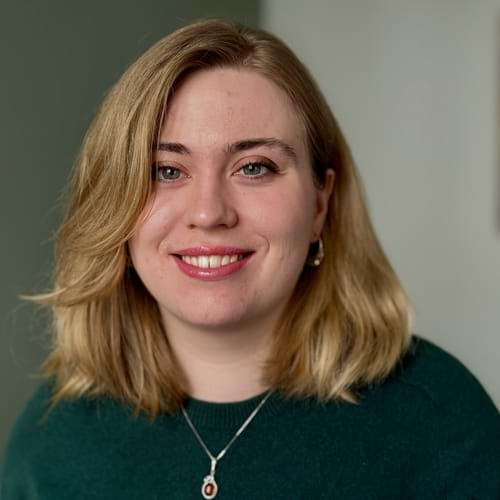Cognitive assessment improves self-image in young adults with CP
Many young adults with Cerebral Palsy (CP) face cognitive challenges in their daily lives. However, the primary focus tends to be on physical difficulties. A neuropsychological assessment can give people with CP positive insights – as it did for 26-year-old Carla Moos.
It took Carla Moos 26 years, spanning childhood, adolescence, and beginning of adulthood – to understand why her education, work, and social life were particularly demanding.
While the physical difficulties of most people with CP are evident, many also experience cognitive challenges without fully understanding their significance.
Fourteen people with CP participated in a neuropsychological assessment at the Elsass Foundation, including Carla, who was born with CP.
"It’s meant a lot to me to understand myself and the cognitive effects of having CP. I’ve lived with it for many years and I’m used to accommodating my physical challenges, but I'm not as used to accommodating my cognitive difficulties. I just thought it was me being tired, silly, or lazy," explains Carla.
A neuropsychological assessment examines cognitive abilities, providing individuals with a better understanding of themselves and insight into how to navigate everyday situations.
"I’ve come to understand what my problems are and how I need to help myself. While consulting with a doctor is helpful, knowing how to apply the information can be difficult. The Elsass Foundation gave me time to reflect on the information, and we talked about how I can actively use it. It has really helped me," says Carla.

Carla Moos, university student.
More focus on motor than cognitive difficulties
Neuropsychological assessments are very valuable tools. But for many young people and adults with CP, it’s difficult to get one because of a lack of awareness and knowledge.
Julie Nyvang Christensen is a neuropsychologist at the Elsass Foundation and is responsible for Carla’s assessment. Carla is part of a neuropsychological assessment initiative for 16-30 year-olds.
"They get to know themselves better. They can use the insight they gain from the assessment in their education or when applying for jobs. Many of them feel like they are met with unrealistic expectations. They often encounter setbacks because cognitive difficulties aren’t treated with the same consideration as physical ones," explains Julie Nyvang Christensen.
Carla, a university student, experiences cognitive challenges during her studies and in other everyday activities.
"I can get tired very quickly. If I do something that requires a lot of mental effort, I often feel like I need to sleep. Once I get mentally tired, it also starts to affect me physically. When I’m tired, I fall and stumble more," says Carla.
For people with CP, the primary focus is often on physical and visible difficulties.
Carla has always felt that CP affects her cognitively, but she’s never had this acknowledged by a professional before.
"I once read that people with CP can have trouble with mathematics – I do too, but I haven't felt it was okay to tell my teacher that it might be because of my CP. I've always thought it was a bad excuse," says Carla.
Self-insight and new tools
To gain insight into how CP affects Carla and the other participants cognitively, the team behind the cognitive assessment initiative has conducted a wide range of cognitive tests and asked participants to fill out questionnaires. They have also had conversations with Christensen about how their cognitive differences can affect their daily lives.
"Several participants have said they've gained a better understanding of themselves, and that it's been an eye-opening experience. Some people thought certain tasks were just too difficult, but found out the difficulty was actually with issues such as concentration."

Julie Nyvang Christensen, neuropsychologist at the Elsass Foundation.
Not only has Carla learned from Julie Nyvang Christensen about the cognitive impacts of CP, but she has also gotten help from an occupational therapist to navigate daily challenges.
"I spoke with the occupational therapist about my biggest challenges in everyday life. Dealing with these difficulties involves working on yourself and finding ways to hack your challenges," explains Carla, adding:
"I’ve come to understand what my problems are and how I need to help myself. While consulting with a doctor is helpful, knowing how to apply the information can be difficult. The Elsass Foundation gave me time to reflect on the information, and we talked about how I can actively use it. It has really helped me," says Carla.
One of the goals of the assessment has been to give participants self-insight, understanding, and help them become more aware of their own resources.
Carla uses the timer on her phone to ensure she leaves the house on time in the morning and doesn’t lose track of time. She also often uses GPS.
"For example, I don't have the best sense of direction. I thought it was embarrassing that I couldn't find my way from A to B without GPS on a route I've navigated 1000 times. But I've taught myself it's a part of my CP, and that's okay," says Carla.
Better self-image
Participants leave the neuropsychological assessment with a sense of calm, better insight, and more clarity. They describe seeing themselves in a kinder light.
"For several participants, the puzzle is starting to come together. They see themselves in a new light," says Julie Nyvang Christensen.
For Carla, everyday life has not only become easier, but she has also changed the way she thinks about herself.
"I've become a little more accepting of myself. I’ve come to terms with certain parts of myself. I used to isolate my physical disability from the rest of me," says Carla.
The new self-insight and perspective is valuable in participants' experiences.
"For example, some participants say they now feel a greater sense of value at their workplace. If the environment can accommodate their cognitive challenges, they feel competent and can solve tasks they thought were beyond their reach," explains Julie Nyvang Christensen.
Cognitive insight also comes with demands
For Carla, learning about her cognitive challenges has been helpful, but it has also been a demanding process of self-realization.
"It’s been difficult for me to learn about my problems. I always thought I was a little bit physically challenged, and that I was completely normal otherwise. I sensed there were some cognitive difficulties, but I hadn’t really incorporated it into my daily life," she says and continues:
"Of course, I can't stop doing it, but I can plan my life in a new way."
Help for relatives
Carla sees the value of the assessments not only for herself, but also for friends, family, and other relatives.
"I brought my parents to the review of the neuropsychological assessment. Suddenly, they understood me in a different way and found answers to why I have struggled with certain things in my life," says Carla.
Her relatives have been open, understanding, and curious about the new insights into how CP affects her cognitively.
"Self-insight often helps people take action. For participants in the assessment initiative, it became easier for them to speak openly with bosses, relatives, and others about their cognitive skills – both their resources and challenges," says Julie Nyvang Christensen.

